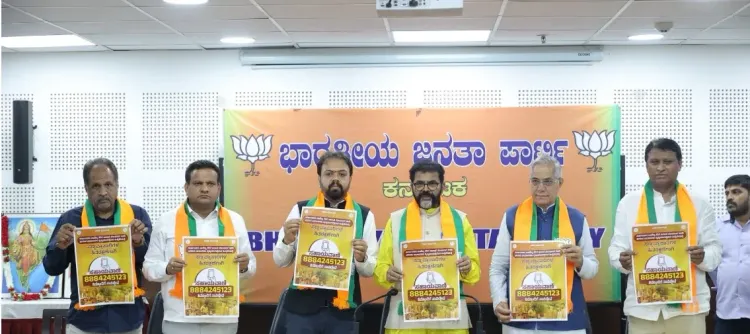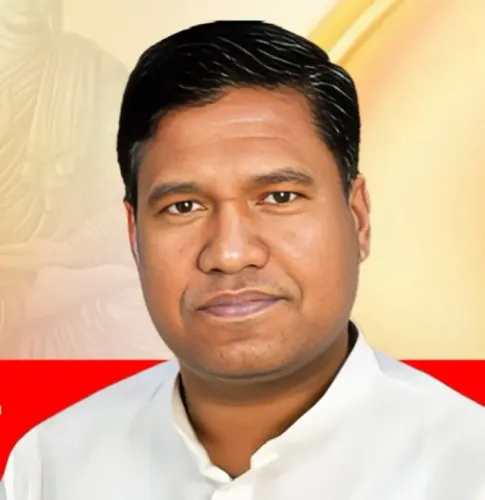How is K'taka BJP Supporting Small Traders Amid GST Controversy?

Synopsis
Key Takeaways
- The BJP launched a helpline for small traders in Karnataka.
- Notices from the state government have created confusion among traders.
- GST applies only if annual turnover exceeds Rs 40 lakh.
- Exemptions exist for certain goods under GST.
- The state GST department has failed to educate traders about their tax obligations.
Bengaluru, July 19 (NationPress) The Karnataka BJP has introduced a new helpline aimed at protecting the rights of small traders amidst ongoing tensions surrounding GST regulations in the state.
During a press conference held at the State BJP Office, Jagannath Bhavan in Bengaluru, Chalavadi Narayanaswamy, the Leader of the Opposition in the Legislative Council, announced that this helpline (8884245123) will be operational from July 21, focusing on the well-being of small traders.
He pointed out that notices from the state government have already caused confusion and fear among street vendors and small traders.
Narayanaswamy criticized the Congress-led state government for its inability to provide clarity on what qualifies as taxable income.
According to data from the Central government, he mentioned that traders with an annual turnover exceeding Rs 40 lakh must register and remit GST.
“Service providers with a turnover surpassing Rs 20 lakh are also obligated to pay GST. However, many notices dispatched by the state lack validity,” he claimed.
“Traders are neither tax evaders nor criminals. They are often unaware of tax regulations, and the state government has failed to educate them,” he stated.
Narayanaswamy urged the state government to prioritize the welfare of poor traders instead of instilling fear.
He elaborated that under Central government guidelines, GST applies only if annual turnover exceeds Rs 1.5 crore at a one percent rate.
“For street vendors to be liable for GST, they must possess a permanent shop and address. There is an exemption for turnover up to Rs 40 lakh; thus, issuing notices to traders with turnover above Rs 20 lakh has resulted in confusion,” he added.
He also remarked that transactions through apps like Paytm, PhonePe, and Google Pay are being monitored, and funds transferred to traders' bank accounts are being used to issue notices.
“However, it remains unverified whether the turnover surpassing limits is due to genuine business or loans and other transactions,” he clarified.
G.S. Prashanth, the State Convener of the BJP's Economic Cell, pointed out that items such as flowers, fruits, vegetables, milk, meat, paneer, and bangles are exempt from GST.
“Even if someone generates Rs 10 crore in turnover from these exempt items, GST registration remains unnecessary. Nevertheless, notices have been issued to such traders by the state GST department,” he alleged.
He added that GST regulations prohibit the use of third-party data for tax notices without proper verification.
“Data from Paytm, PhonePe, or Google Pay needs to be validated first. Officials must ensure that the trader's goods fall under GST before sending notices. Sadly, this due process has been neglected,” Prashanth asserted.
He continued: “The state GST department has not taken steps to inform street vendors about tax obligations. Almost 90 percent of traders fall under state GST jurisdiction, while only 10 percent are subject to Central GST. Yet, without outreach or information dissemination, the state has fostered fear among small traders.”
Consequently, he contended that the 14,000 notices issued by the state government are illegal and unconstitutional.
Among those present at the press conference were Rajya Sabha MP Lehar Singh, Chikkaballapur district president S.V. Ramachandragowda (Seakal), BJP Medical Cell state convenor Dr. K. Narayan, BJP Economic Cell state convenor G.S. Prashanth, and former BJP state spokesperson G.V. Krishna.
In response to inquiries about the state's tax notices to small traders, State BJP President B.Y. Vijayendra remarked, “We discussed this with party leaders. The Congress government, led by Siddaramaiah, which is struggling to raise funds for its guarantee schemes, is now threatening street vendors with tax notices.”
“While GST revenues go to the Centre, it’s evident that no other state in the nation has witnessed such occurrences. In Karnataka, the state government struggles with financial management for guarantees and developmental programs. Under the Chief Minister's directive, they are coercing traders and street vendors,” he concluded.










